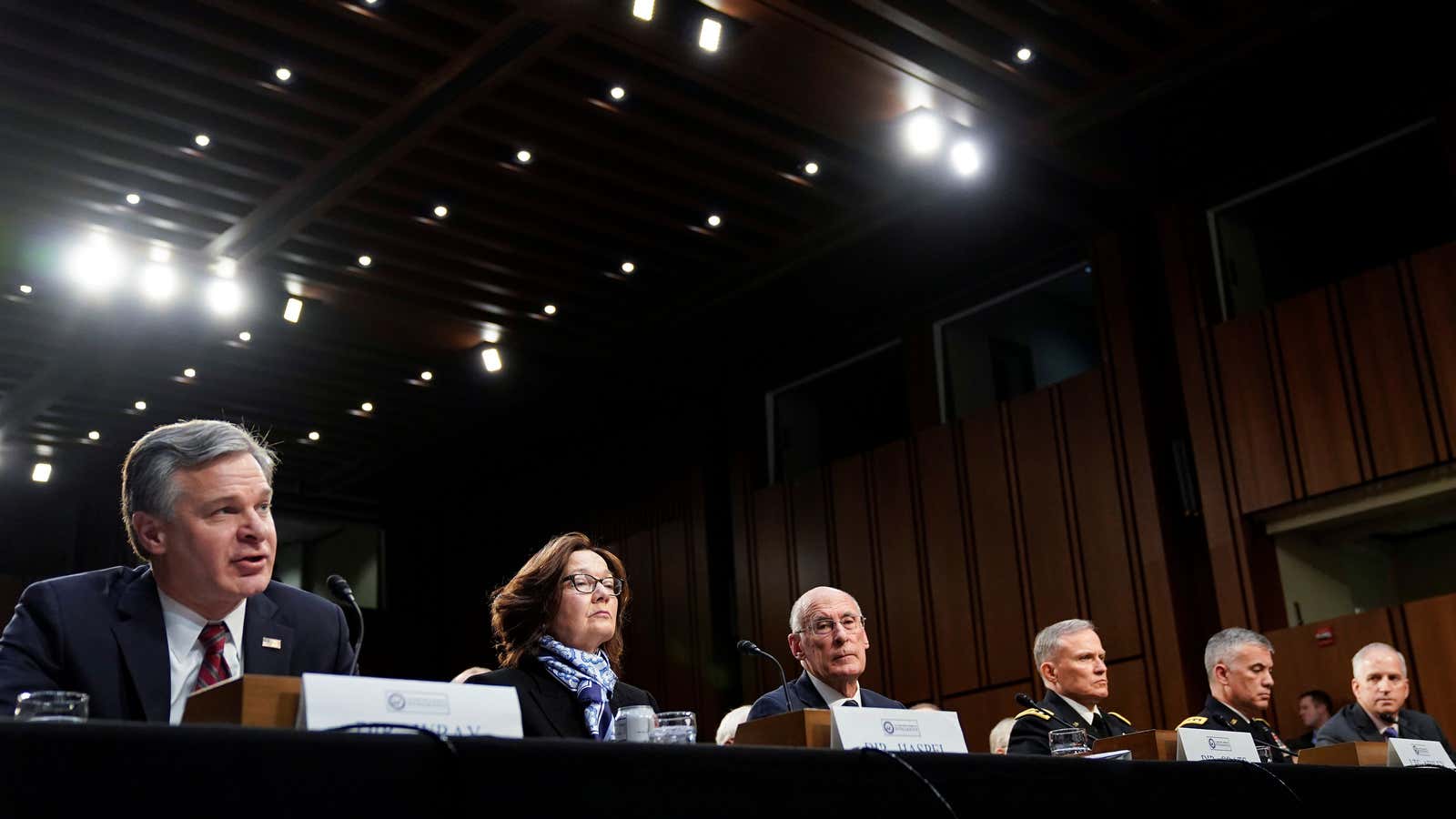North Korea is “unlikely” to give up its nuclear weapons, ISIS is still a threat, Russia continues to interfere in the US political process, and Iran is “not currently” developing a nuclear device.
That’s according to US director of national intelligence Daniel Coats, who testified today (Jan. 29) before the Senate Select Committee on Intelligence. His assessment of the global threats facing the US stands in stark contrast to that of Donald Trump, who has proclaimed Kim Jong Un ready to denuclearize, said ISIS has been defeated, insisted Russia was not targeting the US, and declared Iran in violation of the 2015 Joint Comprehensive Plan of Action—under which Iran agreed to limit its nuclear program in exchange for sanctions relief.
Threats come from a “toxic mix of strategic competitors, regional powers, weak or failed states, and non-state actors using a variety of tools in overt and subtle ways to achieve their goals,” Coats said, mentioning China, Russia, North Korea, and Iran specifically.
Also appearing before the committee were FBI director Christopher Wray, CIA director Gina Haspel, Defense Intelligence Agency director Robert Ashley, National Security Agency director Paul Nakasone, and National Geospatial Agency director Robert Cardillo.
Not once did any of them mention illegal immigration or groups of asylum seekers making their way to the southern border of the US, where Trump says a “national emergency” is playing out.
Nor did they downplay Russian attempts to interfere in the US political process, which they characterized as ongoing. Trump has not been willing to accept the unanimous conclusion of the US intelligence community that Russia tried to tilt the 2016 election.
Said Coats: “Our mission is to seek the truth and speak the truth…Despite the swirl of politics…our mission is to keep our heads down, our focus on the mission we have to achieve in order to keep the American people safe and our policymakers aware of what’s happening.”
Here is how Coats addressed key issues:
Election security
Election security “has been, and will continue to be, a top priority for the intelligence community,” he said. “We assess that foreign actors will view the 2020 US elections as an opportunity to advance their interests. We expect them to refine their capabilities and add new tactics as they learn from each other’s experiences and efforts in previous elections. On the heels of our successful efforts to protect the integrity of the 2018 midterm elections, we are now focused on incorporating lessons learned in preparation for the 2020 elections.”
Disinformation
China, Coats said, has undertaken “methodical and long-term efforts” to achieve global superiority by touting a “distinctly Chinese fusion of strong-man autocracy and a form of western-style capitalism as a development model and implicit alternative to democratic values and institutions.” In contrast, Russia relies on “misdirection and obfuscation as it seeks to destabilize and diminish our standing in the world.”
Cyber warfare
China, Russia, North Korea, and Iran “are advancing their cyber capabilities, which are relatively low-cost and growing in potency and severity,” Coats said. This threatens “both minds and machines in an expanding number of ways, such as stealing information, attempting to influence populations, or developing ways to disrupt critical infrastructures.”
The Iran deal
Tehran, Coats said, is a sponsor of terrorism, and maintains the “largest inventory of ballistic missiles in the Middle East.” However, he added, “we do not believe Iran is currently undertaking the key activities we judge necessary to produce a nuclear device.”
North Korean nukes
And while Trump goes about arranging a second summit with Kim, Coats told lawmakers that the North Korean leadership views its nuclear arsenal as crucial to the regime’s survival—an assessment “bolstered by our observations of some activity that is inconsistent with full denuclearization.”
